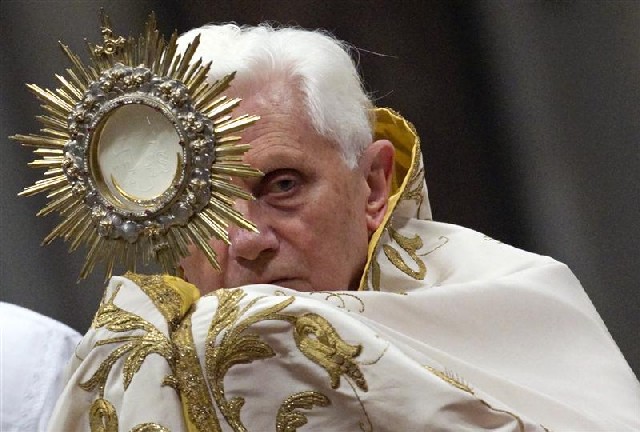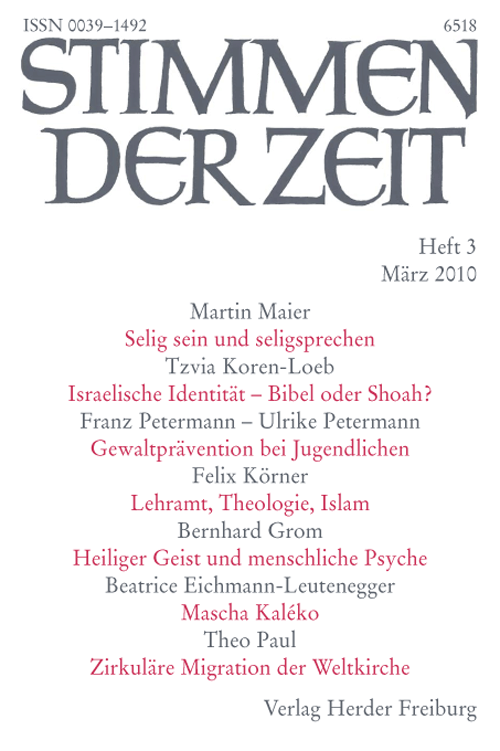Reuters
March 10, 2010
http://blogs.reuters.com/faithworld/2010/03/11/focus-turns-to-pope-as-german-dutch-sex-abuse-scandals-unfold/?p=12244?tempedition=debatehub
EUROPE -- The more the scandal of Catholic priests sexually abusing boys in Germany spreads, the more the focus turns to Rome to see how Pope Benedict reacts. The story is getting ever closer to the German-born pope, even though he has been quite outspoken denouncing these scandals and had just met all Irish bishops to discuss the scandals shaking their country. Nobody's saying he had any role in the abuse cases now coming to light in Germany. But the fact that some took place in Regensburg while he was a prominent theologian there, that his brother Georg has admitted to smacking lazy members of his choir there and that Benedict was archbishop in Munich from 1977 to 1991 lead to the classic cover-up question: what did he know and when did he know it?
 |
| Pope Benedict XVI in the Saint Peter's Basilica at the Vatican, 2 Feb 2010 Photo by Max Rossi |
This is only the start of what can be a long, drawn out and possibly damaging story for Benedict's PR-deficient papacy. His crises to date have been linked to his statements or decisions, such as the controversial Regensburg speech that offended Muslims or several run-ins with Jews over restoring old prayers they consider anti-Semitic or rehabilitating an ultra-traditionalist priest who is also a Holocaust denier. But now it's about what he did or didn't do in the past and how he moves to avoid further scandals in the future.
 |
| Stimmen der Zeit, March 2010 edition |
As my analysis today put it:
In the Gospel of Matthew, Jesus says that if anyone leads innocent children to sin, "it would be better for him to have a great millstone hung around his neck and to be drowned in the depths of the sea."Benedict will meet Archbishop Robert Zollitsch, president of the German Bishops' Conference, at the Vatican on Friday to discuss the scandals and address a letter to the Irish people, possibly on St. Patrick's Day next Wednesday. Other stories we've run in this series include "Vatican says wrong to single out Church over abuse", "Pope's brother "didn't know of school's brutality", "Germany wants Catholic clarity on abuse cases" and FACTBOX – Sex abuse scandals in the Catholic Church."
That passage must now be ringing in the ears of the Roman Catholic clergy in Germany and the Netherlands, where the Church's latest scandals of priests sexually abusing boys have broken out, and echoing down the marbled halls of the Vatican.
The alarm bells are tolling all the more urgently in Rome, where tenuous links run from Bavarian boarding schools all the way to the German-born Pope Benedict. Critics are asking what he knew and did then and what he will do now.
Fr. Andreas Batlogg S.J., editor in chief of the German Jesuit monthly Stimmen der Zeit, said these abuse cases would be "radically cleared up, even if it's uncomfortable" but also stressed how difficult that might be. "It's very hard to go back 30 or 40 years with today's knowledge and crisis management and ask if something was right," he told me by phone from his office in Munich. "The Church is learning now. There has been a change of perspective, now the victims are in the spotlight, not the perpetrators any more."
In an article for his journal's April edition, the theologian and psychotherapist Wunibald Müller warns his German readers that the U.S. Catholic Church "has not yet recovered" from the scandals that hit it early in the last decade. "It would have been spared some shocks if it had taken available insights and proposed procedures more seriously," he wrote. "In cases of sexual abuse of minors by priests, the only option is a relentless approach that shines unlimited light on the situation. Nothing must stay in the dark, be hushed up or hidden or played down. Nothing."
But how far will Benedict go in "shining unlimited light" on the situation in Germany? He seemed to be on that path in Ireland after the devastating Ryan and Murphy reports there, but he disappointed Irish abuse victims by not shaking up the Irish hierarchy as many expected he would when or soon after he called all Irish bishops to Rome for talks in mid-February. Will he take a tougher stand with the Church in Germany?
It's interesting to see the bishops in the neighbouring Netherlands, faced with a similar wave of abuse charges against Church-run boarding schools there, promptly decided to set up an independent commission led by a Protestant to examine the issue. The German bishops fought against suggestions from Berlin for a probe just into Catholic schools and now look set to agree to "round table talks" that will include Protestant leaders, family associations and school and local officials. This waters down the focus on the Catholic Church, which insists the probe must not overlook the far larger number of pedophile cases that take place outside its walls. It will be interesting to see if the Dutch bishops earn more public support with their inquiry than the Germans win with theirs.
 |
| Munich with its landmark cathedral (Frauenkirche), 9 Feb 2008 Photo by Alexandra Beier |
The big question is whether someone in the Munich archdiocese will come forward with embarrassing charges of being abused sexually by a diocesan priest during the former Cardinal Joseph Ratzinger's time as archbishop there. Seen from today's perspective, where the focus is now on the victim rather than the perpetrator, even not knowing about abuse cases on one's watch could be taken as a sign of negligent leadership. Once a debate starts off like that, who knows where it will end?
Benedict and his Vatican aides have stumbled badly on issues easier to handle than this one. Especially after the uproar over the Holocaust-denying Bishop Richard Williamson, his fellow Germans hardly seem ready to cut him any slack. There may be some stormy times ahead.
Any original material on these pages is copyright © BishopAccountability.org 2004. Reproduce freely with attribution.